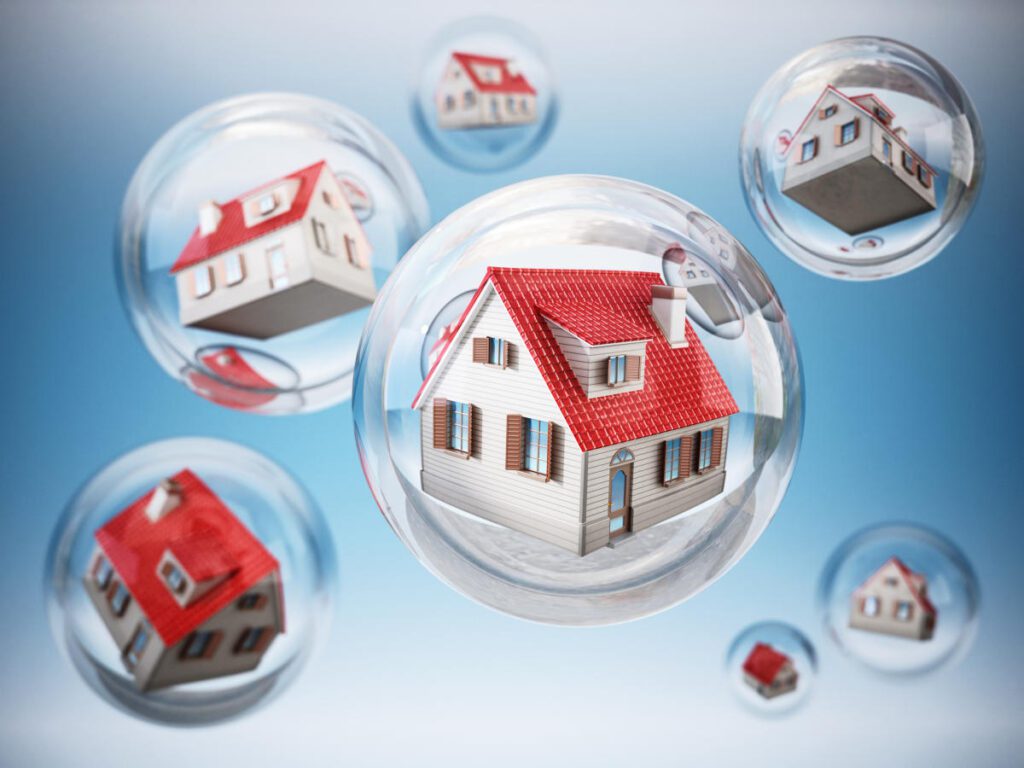housing bubble in real estate can be both exhilarating and dangerous. For homeowners, investors, and the broader economy, understanding the dynamics of real estate cycles and staying informed about market trends is crucial. While it can be tempting to join the buying frenzy, maintaining a long-term perspective and exercising caution can help avoid the pitfalls of an overinflated market.

What is a Housing Bubble?
A housing bubble occurs when real estate prices increase beyond their intrinsic value, driven by speculative demand, easy credit, and irrational exuberance. Eventually, when the market cannot sustain these inflated prices, the bubble “bursts,” leading to sharp declines in property values. The cycle can be devastating for homeowners, investors, and the broader economy.
The Key Phases of a Housing Bubble
Post-Crash Recovery: After the bubble bursts, the market enters a period of correction, where home prices fall to more reasonable levels. This recovery phase can take years, with some markets taking longer than others to stabilize.
Steady Growth: In the early stages of a real estate boom, housing prices rise moderately. The market is typically characterized by stable demand and manageable levels of inventory.
Speculative Buying: As the real estate market picks up steam, speculative buying kicks in. Investors, as well as homebuyers, begin to believe that property prices will continue to rise indefinitely, and thus, they overpay for homes. Mortgage lenders may also loosen their standards, offering subprime loans to individuals with lower credit scores.
Factors Contributing to a Housing Bubble
Limited Supply: In some cases, the supply of homes does not keep up with demand, further inflating prices.
Speculative Investment in Real Estate: Investors buying homes with the expectation of short-term price increases rather than long-term rental income or property value stability.
Low Interest Rates: Central banks may lower interest rates to stimulate economic growth, making it cheaper for people to borrow money for homes, fueling demand.
Loose Lending Standards: Banks and mortgage lenders relax their requirements, approving loans for buyers who may not have the means to repay them.
The Impact of a Housing Bubble on the Real Estate Market
A housing bubble and subsequent crash can have profound effects on the real estate market:
Property Value Losses: Homeowners who purchased at the peak of the market may find themselves “underwater,” with properties worth less than their mortgage debt.
Mortgage Defaults and Foreclosures: As home prices fall, mortgage defaults and foreclosures increase, further depressing the housing market.
Economic Recession: A significant housing crash can trigger a recession, affecting jobs, wages, and consumer spending. Real estate developers, homebuilders, and agents may all see a sharp decline in business activity.
Investor Losses: Real estate investors who bought properties during the peak will often face significant losses as the value of their portfolio declines.
Government Intervention: In response to housing crises, governments may implement policies like bailout programs, mortgage relief initiatives, or stimulus packages to mitigate the damage.
How to Protect Yourself in a Housing Bubble
- Understand Market Fundamentals: It’s important to assess whether home prices are being driven by genuine demand or speculative investment.
- Avoid Overleveraging: While interest rates may be low, borrowing too much can put you at risk if the market declines.
- Diversify Your Investments: If you’re an investor, consider diversifying your portfolio across different asset classes to reduce exposure to a potential housing market downturn.

